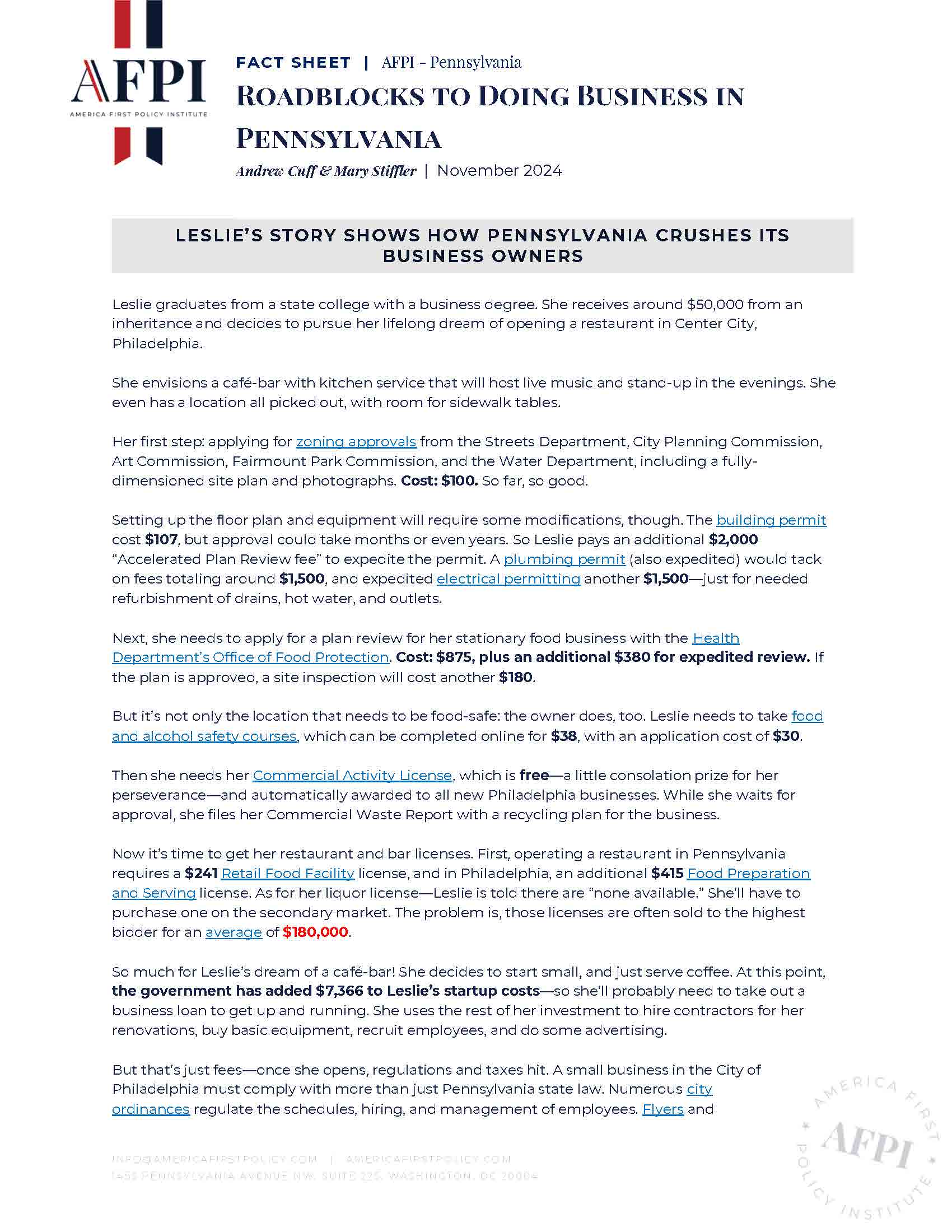Roadblocks to Doing Business in Pennsylvania
Leslie’s Story Shows How Pennsylvania Crushes its Business Owners
Leslie graduates from a state college with a business degree. She receives around $50,000 from an inheritance and decides to pursue her lifelong dream of opening a restaurant in Center City, Philadelphia.
She envisions a café-bar with kitchen service that will host live music and stand-up in the evenings. She even has a location all picked out, with room for sidewalk tables.
Her first step: applying for zoning approvals from the Streets Department, City Planning Commission, Art Commission, Fairmount Park Commission, and the Water Department, including a fully-dimensioned site plan and photographs. Cost: $100. So far, so good.
Setting up the floor plan and equipment will require some modifications, though. The building permit cost $107, but approval could take months or even years. So Leslie pays an additional $2,000 “Accelerated Plan Review fee” to expedite the permit. A plumbing permit (also expedited) would tack on fees totaling around $1,500, and expedited electrical permitting another $1,500—just for needed refurbishment of drains, hot water, and outlets.
Next, she needs to apply for a plan review for her stationary food business with the Health Department’s Office of Food Protection. Cost: $875, plus an additional $380 for expedited review. If the plan is approved, a site inspection will cost another $180.
But it’s not only the location that needs to be food-safe: the owner does, too. Leslie needs to take food and alcohol safety courses, which can be completed online for $38, with an application cost of $30.
Then she needs her Commercial Activity License, which is free—a little consolation prize for her perseverance—and automatically awarded to all new Philadelphia businesses. While she waits for approval, she files her Commercial Waste Report with a recycling plan for the business.
Now it’s time to get her restaurant and bar licenses. First, operating a restaurant in Pennsylvania requires a $241 Retail Food Facility license, and in Philadelphia, an additional $415 Food Preparation and Serving license. As for her liquor license—Leslie is told there are “none available.” She’ll have to purchase one on the secondary market. The problem is, those licenses are often sold to the highest bidder for an average of $180,000.
So much for Leslie’s dream of a café-bar! She decides to start small, and just serve coffee. At this point, the government has added $7,366 to Leslie’s startup costs—so she’ll probably need to take out a business loan to get up and running. She uses the rest of her investment to hire contractors for her renovations, buy basic equipment, recruit employees, and do some advertising.
But that’s just fees—once she opens, regulations and taxes hit. A small business in the City of Philadelphia must comply with more than just Pennsylvania state law. Numerous city ordinances regulate the schedules, hiring, and management of employees. Flyers and outdoor signs both require a license, with a $20 minimum fee plus $0.58 per square foot of signage. And when Leslie takes one look at the list of taxes she’ll owe, she feels like giving up:
- Federal corporate tax (21%), Social Security (6.2%), Medicare (1.45%), and unemployment (6% on first $7,000).
- Pennsylvania corporate net income tax (8.99%), personal income tax (3.07%), sales tax (6%), and employer withholding tax (3.07%).
- Philadelphia’s Business Income and Receipts Tax (BIRT) on both profits (5.81%) and sales (1.415%).
- Philadelphia’s net profit tax (3.75%), parking tax (22.5% of parking payments), soda tax (.015 per ounce), and wage tax (3.75%).
With all the startup costs, restrictions, and taxes on her new restaurant, Leslie is not sure she will make it past her first year. In an environment so hostile to entrepreneurship, is it any wonder why over 40% of Pennsylvania restaurants are currently delinquent on rent?
Leslie’s experience is no different than that of thousands of other entrepreneurs who have tried to open businesses in Pennsylvania cities like Philadelphia or Pittsburgh. Every year, rankings of best and worst states to start a business land the Keystone State in the bottom ten.
Recent polling from the Commonwealth Foundation indicates that 76% of Pennsylvanians think the state’s business climate has gotten worse or remained the same over the last decade. For years, the number of new businesses opening each year has failed to measurably outpace the number of businesses that close.
What’s the solution? Tax and regulatory reform—commonsense measures to loosen the restrictions that prevent entrepreneurs from making their start.
- Lower the Corporate Net Income Tax to make Pennsylvania more competitive and attract new businesses to the state.
- Reduce zoning and permitting approval times by setting maximum response times and eliminating redundant bureaucratic steps.
- Limit the power of municipalities and prevent regulations that restrict new businesses by standardizing rules to encourage open competition and growth.
- Reform the liquor license quota system to allot more licenses in high-demand areas like Philadelphia, fostering growth in the restaurant and bar industry.
- Streamline occupational licensing requirements for entrepreneurs and skilled workers like bartenders to help new business owners and hospitality staff get to work faster.
